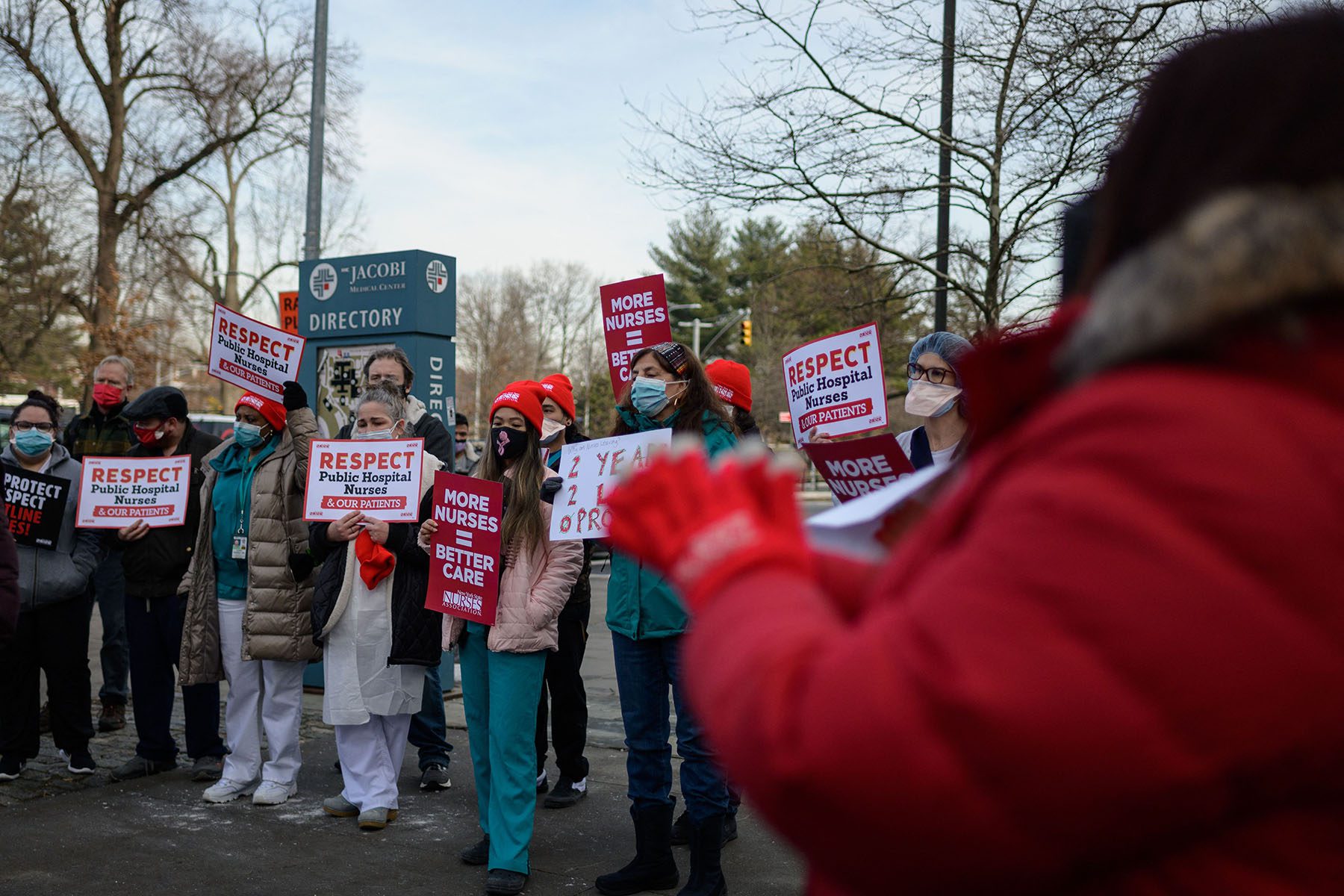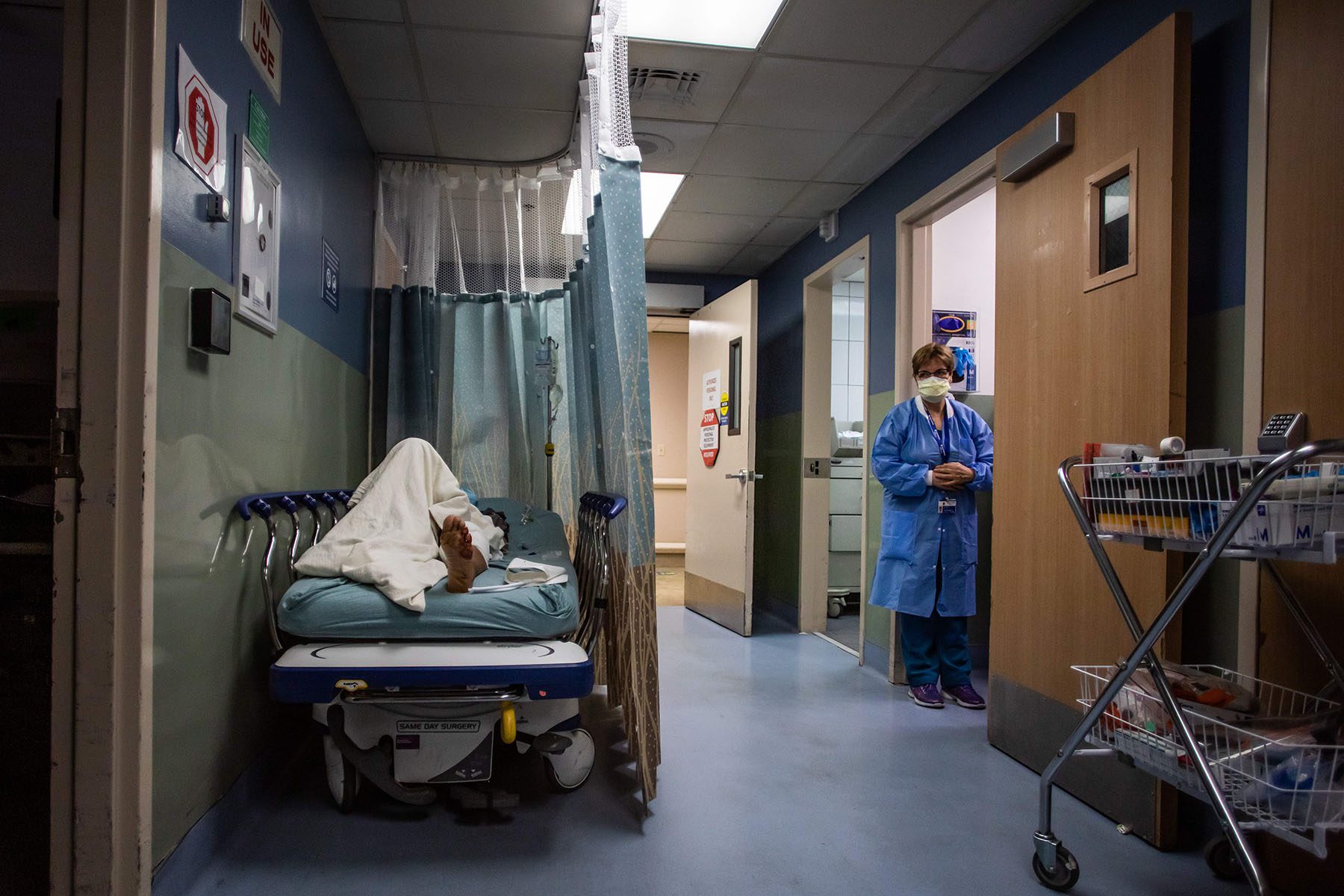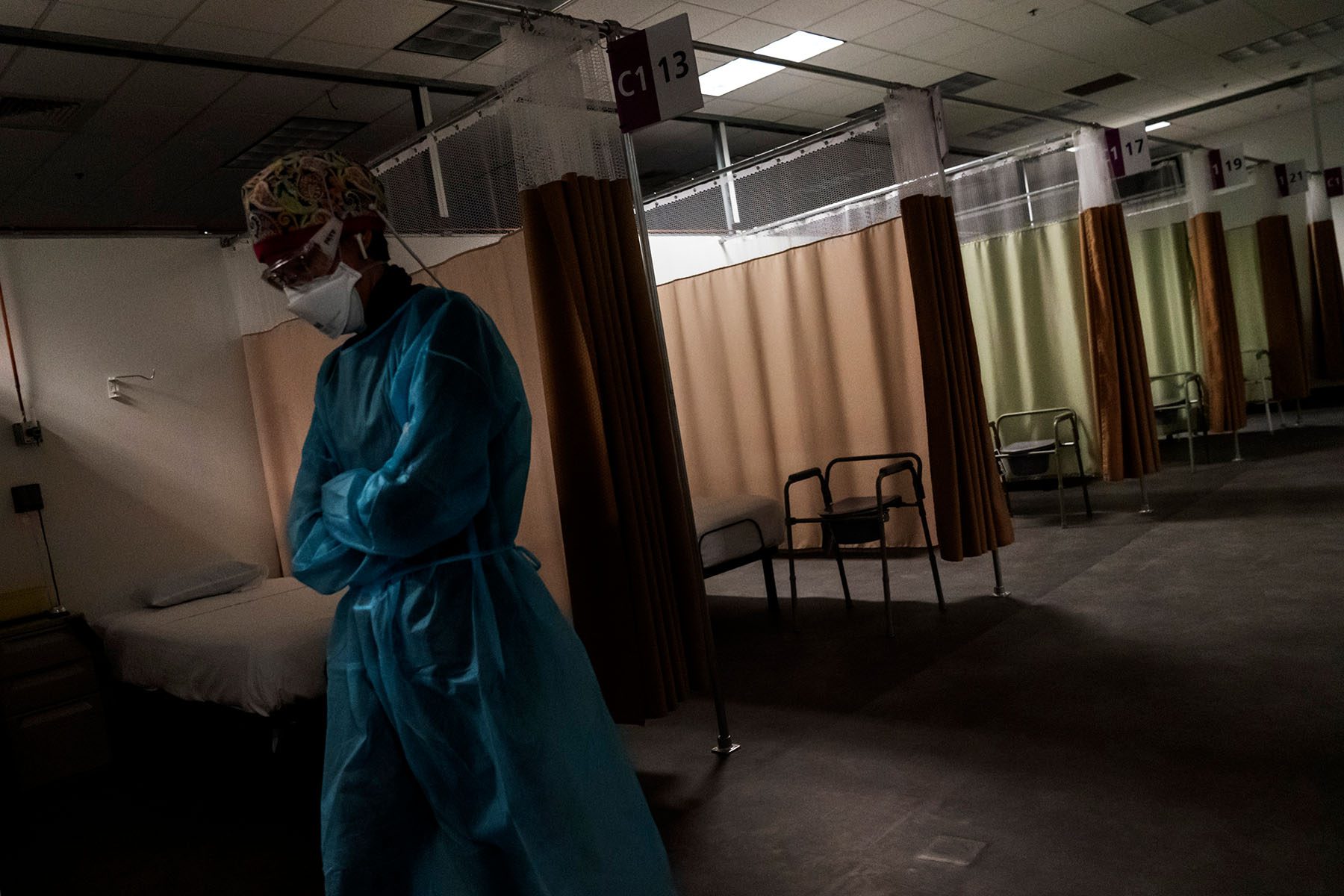[ad_1]
Originally published by The 19th
For the nurses who have witnessed the darkest moments of the pandemic under harrowing work conditions, the rise in demand for travel nursing has come as a welcome opportunity.
Agencies that staff nurses around the country started paying as much as twice nurses’ regular salaries to those willing to travel to areas with a staffing need. Thousands of nurses have jumped at the chance.
It made sense for people like Tammy Pender, a registered nurse in Florida who had racked up debt to care for her family.
Pender’s father could no longer afford his house, so she took on a second mortgage and car payment to help him. Her sons, a 10-year-old and 11-year-old twins, were at home like most kids in virtual learning, and her husband left his job to help care for them. Pender, who was the higher wage earner, said the decision made sense at the time, but the debt caught up to them fast — and so did the burden of the frontlines of the pandemic.
Pender said nurses were having to take on multiple roles, working as phlebotomists and techs while managing huge patient workloads. And then there was the mental toll. Nurses were being called heroes early in the pandemic for fighting the virus, but many were feeling like their pay and the working conditions were not commensurate with the difficulty of the work.
“The amount of death that I have seen and the amount of patients I have watched breathe their last breath is something I don’t ever want to experience again,” said Pender, 45.
Travel nursing gave her the chance to do work she loved but for pay that she said made it more worthwhile. For the past 16 months, she’s taken eight- to 13-week contracts as far as California and North Dakota. She’s away from her kids often, but she’s been earning about 50 percent more than she did as a staff nurse, money her family has used to cut down their debt and make some necessary renovations on her dad’s home.
But, in a twist that has sent the majority-women nursing community into an uproar in recent weeks, the benefits of travel nursing could be in jeopardy, and nurses are raising questions about whether the profession in general needs to raise its wages.
In the last few months, several groups, including the American Hospital Association (AHA), the American Health Care Association/National Center for Assisted Living and 200 members of Congress, have called for an investigation into claims that agencies that place travel nurses around the country have been “price gouging” hospitals in need of staff.
The AHA has requested the Federal Trade Commission investigate the agencies, and late last month, a letter signed by a bipartisan group of legislators also asked the White House to investigate the claims.
Rep. Peter Welch, a Democrat from Vermont, and Morgan Griffith, a Republican from Virginia, wrote that they have received reports saying staffing agencies have inflated prices by “two, three or more times pre-pandemic rates” while taking 40 percent or more being charged to hospitals in profit. At least eight private-equity firms have bought at least seven staffing agencies since early 2021, according to a report in STAT News.
“We urge you to ensure that this issue gets the attention from the federal government it merits to protect patients in dire need of life-saving healthcare treatment and prevent conduct that is exacerbating the shortage of nurses and straining the healthcare system,” they wrote.

The White House did not comment on whether it was responding to the contents of the letter, and the Federal Trade Commission also declined to comment on whether an investigation was underway.
A spokesperson for the AHA said in a statement that the goal is to determine whether the price hikes instituted by travel nurse agencies are “anticompetitive activity” and “price collusion,” which could violate consumer protection laws, result in higher health care costs for patients, and be a burden on taxpayers since the federal government has been stepping in to help cover staffing and other costs during the pandemic.
However, “it is important to note that the AHA has not advocated in any forum for a cap on travel nurse wages,” said AHA spokesperson Colin Milligan. The association added that hospitals have tried to respond to staffing needs by offering referral and retention bonuses, as well as sign-on bonuses.
But many nurses are worried that these investigations could lead to caps on their pay.
In Pennsylvania, Republican state Rep. Timothy Bonner proposed a bill late last month that would cap how much agencies can charge hospitals at 150 percent of the average hourly rate for health care staff.
There’s already some evidence that nurses ultimately feel the impacts of caps on agencies. In Minnesota, one of the two states that already caps what nurse staffing agencies can charge hospitals, pay increased for nurses in 2021 and 2022 but, for this year, is still capped at $62.36 an hour for regular pay and $107.25 in holiday pay for registered nurses. The median hourly wage for an RN in Minnesota was $38.24 in May 2020, the most recent month data is available from the Bureau of Labor Statistics.
The gulf in pay between staff nurses and travel nurses has also raised a bigger question: Could all nurses be paid more? And why aren’t they?
“That’s where nurses are starting to feel, ‘Are we being undervalued?’” said Bianca K. Frogner, the director at the Center for Health Workforce Studies at the University of Washington School of Medicine. “It’s become a bit more of an awakening where I think nurses may have felt undervalued before, but now it’s becoming much more front and center as they’re watching their peers come back” after earning higher wages doing the same work.
Almost 90 percent of registered nurses are women, and about 31 percent are Black, Latina or Asian, according to the Bureau of Labor Statistics. Women make up 75 percent of the health care workforce, but lower pay for nurses has helped drive a gender gap in the industry. Nationwide, the median pay for a registered nurse in 2020 was $75,330, for example, while surgeons, 72 percent of whom are men, earn a median wage of $251,650.
Meanwhile, CEO pay has boomed during the pandemic alongside health care costs. An Axios analysis of filings with the Securities and Exchange Commission found that chief executive pay at 178 health care companies was up 31 percent during the pandemic compared with 2019.
Nurses have reported an increase in depression, burnout, workplace violence and heavy workloads (most states don’t limit how many patients a nurse can have) over the past two years. A September 2021 survey by National Nurses United, the country’s largest nurses union representing more than 175,000 members, found that about 31 percent of hospital RNs said workplace violence was slightly or significantly up during the pandemic. More than a third said they felt “traumatized by their experiences caring for patients,” and more than 57 percent reported that short staffing issues had worsened.

The tension between hospitals and staff has intensified. In Wisconsin, health system ThedaCare asked a court to block a group of workers — four interventional radiology technologists and three nurses — from leaving their jobs for positions at another hospital, ones they said offered a better pay and benefits package, until they could be replaced. A judge granted the restraining order at first before lifting it.
All of those factors — short staffing, disputes about pay or lower pay and burnout — are driving people to leave the industry. A report published in Health Affairs last month analyzing national employment data through mid-2021 for registered nurses, licensed practical nurses and nursing assistants found that as the pandemic went on, nurse employment remained low and wages increased, suggesting a shortage of supply. While unemployment rates, which include people who quit their jobs to seek other employment, largely leveled off for White nurses, nurses of color were still experiencing higher rates of unemployment than pre-pandemic, the report found.
Travel nursing has risen in that same time, with the job volume increasing from about 8,000 positions in early 2020 to more than 48,000 in September 2021, during the height of the delta wave of the coronavirus. Now, the job volume is at about 32,000, according to data from Aya Healthcare, the largest staffing agency. Aya declined to comment on the investigations into staffing agency rates, instead directing to comments made by the American Staffing Association, a trade group for the staffing industry.
In a statement, the American Staffing Association said higher pay for nurses hasn’t translated to substantially higher profits for agencies due to higher labor-related costs like employee screening and overhead costs, including rent.
The group argued that the rates have fluctuated as certain areas have experienced more need than others.
“Nurse staffing rate caps, which are costly and burdensome for states to administer, are not only unnecessary, but are counterproductive because they will distort the nursing market and reduce the availability of nurses in the control states,” the American Staffing Association said.
The average travel nurse is now earning about $3,334 a week on average, according to Vivian Health, a health care hiring marketplace. Contracts can last a couple of days or weeks, and nurses can choose how often they travel. Prior to the pandemic, average travel nurse salaries were about $1,800 a week in 2019.
For travel nurses, the possibility of moves that could cap their pay feels like another slight. People like Courtney Cutrufello are reaching out directly to members of Congress for answers. She spoke to Welch, her representative in her home state of Vermont.
“The fact that it is predominantly women does have a role,” she said. “Historically we have been underappreciated, we have been undervalued — we still have a gender pay gap.”
Welch told The 19th that he does not support capping nurse pay and would support efforts by Congress to ensure a larger percentage of staffing agency fees go directly to nurses, for example.
“I support increasing nurses’ pay and the right of nurses to decide if they want to travel or not. No one has endured more these past two years than nurses on the front lines of this brutal virus, and they deserve better working conditions and better pay,” Welch said in a statement.
But nurses aren’t convinced. If the investigations move forward and agencies are capped, building in protections for nurses would require additional legislation.

“These travel nurse agencies, they are not going to take a substantial decrease in their pay and they are just going to pass it on to the nurses,” said Cutrufello, who is part of a Facebook group of more than 185,000 travel nurses, many of whom are worried they will be directly affected.
Cutrufello has been a travel nurse since March 2021, partially because of the impact of the first months of the pandemic. The memories of the early pandemic days are not distant: coming home and immediately taking her scrubs off to wash them, being worried that she’d get her family sick and experiencing profound burnout. The work hasn’t changed significantly, but at least she is more financially secure as a travel nurse, she said, though she is often away from home.
Many nurses The 19th spoke to said they felt the agency caps were a misdirected way to address the root of the problem, which is a supply and demand issue. Nurses are in high demand because so many have left the profession or reduced their hours. But if working conditions and pay improved, and the focus was instead put on student loan forgiveness or better patient ratios — policies that could support the nurses already staffed in hospitals — nurses would be more likely to stay in those positions.
Michelle Mahon, the assistant director of nursing practice for National Nurses United, the nurses union, said focusing on agency caps that could hurt nurses instead of other fixes the workforce has been requesting for years is emblematic of larger structural problems in the profession.
“I don’t know how many more ways the message can be sent that really we don’t value you — whether it’s through the pay, through the staffing, through devaluing the integrity of the work by providing safe staffing, or from protecting workers from workplace violence,” Mahon said. “If [nurses] have the ability to make more money while doing the exact same thing, then many people see this as an opportunity to at least, in this way, they are feeling valuable.”
While travel nursing has always been an option that has paid more, it has usually been used to fill moments of need in pockets of the country, or when natural disasters hit — not for something with the geographical breadth and longevity of a pandemic. Nurses who are doing it now through the pandemic are doing it for long periods of time. And for some who have other care responsibilities or young children, it’s not an option at all.
Even for those who can do it, it isn’t always the boost in pay it’s advertised to be. Anali Spradlin, an Arkansas-based travel nurse, said she’s had two contracts canceled on her in the past month alone, after she had already traveled to a location and paid for lodging. That’s money she can’t get back.
She’s been a nurse for almost nine years and a travel nurse since last summer. She can do it because her kids are adults. But she has significant expenses, including her house and the travel (only some of which is reimbursed), covering her own health insurance and helping her daughter through school. Both of her daughters are nurses, and she worries how this year will affect the pipeline into the profession.

Applicants to four-year nursing programs grew just 1.5 percent in 2020, the Health Affairs report found, compared with 4.5 percent and 8.5 percent the prior two years, suggesting that the pandemic has chilled what had otherwise been a growing sector.
Spradlin’s youngest daughter quit nursing school for six months because she was discouraged by the stories of nurses during the pandemic who were leaving the field. She’s since returned.
But Spradlin said that even though she enjoys patient care, if her pay was capped, she would consider a case management job from home that wouldn’t subject her to poor staff conditions in the hospital. That’s what ultimately would take a hit if nurses saw their pay diminish, she said.
More would leave the profession, and particularly older nurses would retire, taking years of experience with them.
“We love what we do,” she said, “they are just pushing us to the edge where we are just going to jump off and say, ‘We’re done.’”
[ad_2]
Source link
